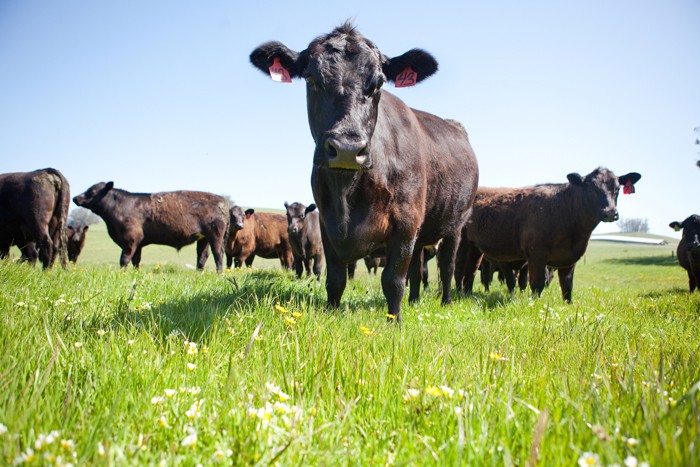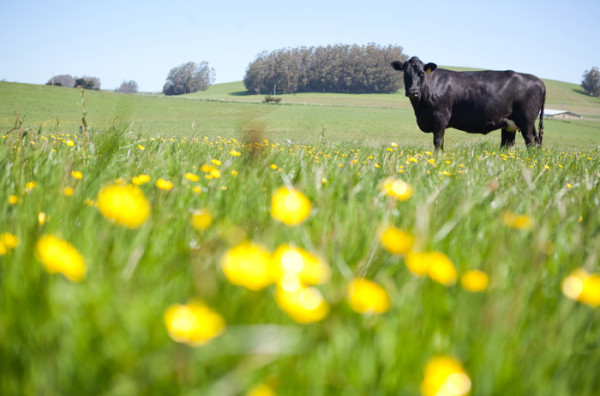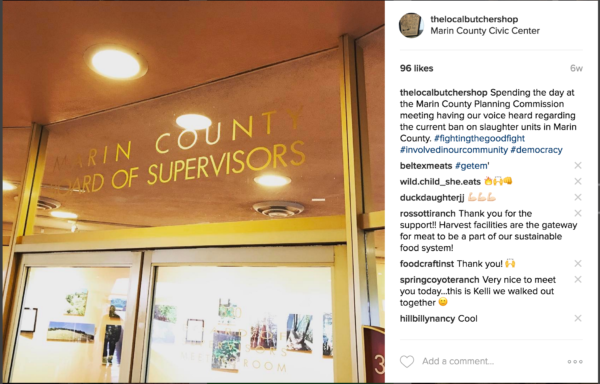
Kelly Taylor is a butcher at The Local Butcher Shop. In this guest post, she reports on the challenges facing Bay Area ranchers as slaughter options become more limited. She also outlines immediate actions that concerned residents and meat eaters can take to support the ranching community in Marin County.
An Eroding Slaughter Situation for Bay Area Ranchers
Last month, Marin Sun Farms slaughterhouse informed certain Marin-based small ranchers that they would no longer have access to animal harvesting facilities at Marin Sun Farms.
Marin Sun Farms is the only beef slaughter facility that serves small-scale ranches in the greater Bay Area, and for up to 250 miles in any direction.
The recent, but not isolated, declaration of exclusion forces the affected cattle ranchers, now denied access to a vital piece of the ranching process, to harvest their animals at the next nearest available slaughter facility.
Exclusion from equal participation in the industry discourages competition. In any industry, and especially niche markets, competition regulates fair consumer prices and maintains widespread commitment to highest standards in production.
Stemple Creek Ranch, a fourth generation cattle ranch located 12 miles away from MSF slaughterhouse, will now have to travel an extra 235 miles to harvest their cattle.
Dramatically increasing distance travelled to harvest animals is antithetical to the ecological mission and financial bottom-line of local, sustainable, small-farm practices. In the short term, on top of the already higher cost of raising livestock in an ethical and ecologically responsible way, the added costs of long-distance animal transport are prohibitive to both new and established small-scale ranches.

photo by Paige Green
Animals living their entire life cycle on local soil, only to be transported hundreds of miles to slaughter and back to market, invalidates much of the local and sustainable aspect of local sustainable ranching. Additional emissions from increased auto-transport partially negates the ecological benefits of increased soil health through practices like planned rotational cattle grazing. Further, animals experience the added stress of long-distance-travel, which manifests within the body, degrading the quality of meat. Pasture born, raised, and finished is only ecologically positive in so far as the system is integrated from start to finish.
In the long-term, travel to the next facility is not a sustainable option.
The only way to keep cattle ranchers in Marin County, and the greater Bay Area, is to support the process from beginning to end. This includes a possibility of local harvest. Bay Area consumers have shown that they are willing to pay a higher price to support all it takes to bring ‘good meat’ to the table. The market is there, but the means are no longer.
Access to animal harvest for Bay Area ranchers must be maintained: if not through Sonoma County-based Marin Sun Farms, then at another brick-and-mortar facility or mobile slaughter unit similar to successful projects happening for meat on the Central Coast and for poultry in the Sierra Foothills.
The possibilities of a brick-and-mortar facility or a mobile unit are the two solutions currently up for debate and approval by the Marin County Board of Supervisors at their March 14th, 1:30PM meeting. As of today, there are no plans or funding for either option. These rules would either allow for, or not allow for, the possibility of a future site or unit.
The rules set in this meeting are particular to Marin County but the issue at hand affects the greater Bay Area. All voices in support of local meat are encouraged to attend: consumers, industry stakeholders, environmentalists, and on.
If there is no option or other USDA approved beef harvest facility that is accessible to Bay Area small-scale producers, then cattle ranchers will leave Marin County and the greater Bay Area and take their exemplary businesses with them. The already high prices of sustainably raised meat will rise. Marin Sun Farms will have power over who can ranch and sell their own product directly to consumers in the Bay Area and who cannot. And Marin pasturelands, well suited for animal-based agriculture, will be left unmaintained and susceptible to dangers of fire, erosion, and development.

Exclusion from a reasonably local option to harvest cattle poses a serious threat, both long and short term, to the sustained viability of cattle ranchers and the rolling hills of Marin County.
No local slaughter option means no local ranchers. Simple as that.
These ranchers improve our community by promoting best practices in ranching and encouraging healthy (literally and figuratively) industry competition, and naturally maintaining pasturelands characteristic to Marin County and the greater Bay Area.
It is up to local government – and the voices of people who make these lands home – to fight for local meat.
To continue in the slow and important arc toward a more transparent and just food system – including access to quality and environmentally responsible food for all – we must keep ranchers in the Bay Area by acknowledging and fighting for all of the pieces of our food system.
Join us!
Write: BOS@marincounty.org
Show up: Tuesday, March 14th at 1:30pm in Room 330 of the Marin Civic Center

Is the exclusion happening because Marin Sun Farms chose to do so or the givernment is no longer allowing the use of the facility?
Also, March 14th is a Wednesday!
Thank you for this post.